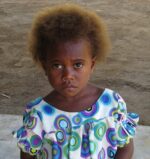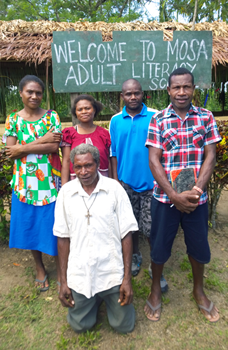ABM Archive Website
THIS WEBSITE CONTAINS ARCHIVE MATERIALS FOR HISTORICAL REFERENCE ONLY
For up-to-date information, including our latest appeals, news, and resources, please visit our current website.
What will Australian AID cuts mean in PNG?
June 10, 2016

Recently, the Department of Foreign Affairs and Trade (DFAT) informed ABM that funding for the CPP program in PNG will be reduced by 30% for FY 2016/17. What is the CPP program and what will be the consequences of these cuts?
The Church Partnerships Program (CPP) in Papua New Guinea has been running since 2004. It has been fostering closer relationships between 7 PNG churches and their Australian church partner development agencies. The PNG CPP has utilised the churches’ grassroots connections right across PNG to run community development projects that have strong local participation and local contributions.
 |
| Locals at the opening of the CPP Mosa Literacy school. © ABM 2015 |
ABM’s component of the PNG CPP has focused on developing community-based adult literacy schools, raising awareness about HIV-AIDS and gender-based violence, and providing youth and women with training in various life-skills such as improved agricultural methods, sewing and baking. We have done this in partnership with the Anglican Church of PNG and Anglicare PNG.
Some of ABM’s more recent results from the CPP program are:
- More than 500 adults have completed the four level literacy and numeracy program since 2014 and over 2000 are currently enrolled. Many of these graduates have gone on to further study and training, either with ABM’s local partner (Anglicare PNG) or other institutions. Many have used their new skills to gain formal employment or start small informal businesses. Some have become volunteer adult literacy teachers.
- In 2014-2015, Anglicare PNG provided HIV-AIDS testing and counselling services to 2,721 men and 3,846 women, partly through support from ABM and the PNG CPP. Anglicare also raised awareness about HIV-AIDS through public events such as World AIDS Day (WAD) commemorations in 5 provinces in December 2015. During these commemorations, Anglicare provided free, confidential HIV testing and counselling to 130 people.
- Since 2014, more than30 Youths have been trained in improved agriculture and animal husbandry methods and provided with seedlings to start their own gardens as well as helping maintain a demonstration garden for others to learn from.
The cuts to the PNG CPP will mean fewer adult literacy classes, less awareness-raising about HIV-AIDS and gender based violence and fewer trainings to support communities to improve their livelihoods. The cuts will also mean that Anglicare PNG will have to defer their plans to pilot a comprehensive and integrated livelihoods project, that was to draw together different Anglicare programs to maximise the positive impact on communities.
The cuts to PNG CPP are part of a reduction in the Australian AID budget from 0.37% of Gross National Income (GNI) in 2013-14 to 0.22% in the current budget. This is the lowest level of Australia Aid since records began.( http://theconversation.com/a-fair-budget-not-for-the-poor-losing-australian-aid-in-record-cuts-41609) These cuts will make a big difference to the ability of poor people in neighbouring countries to access literacy and other opportunities to improve their lives.
In solidarity with the world’s poor, ABM supports the Campaign for Australian Aid http://australianaid.org/


